chapter7动词
Chapter 词汇学

2.2 Three Phases of the Historical Development
• For each phase of the development, the following points must be made clear:
– Time range – Features of English – Social and historical events that influenced English greatly
1. The first peoples known to inhabit the land were Celts. 2. The Germanic tribes include Angles, Saxons, and Jutes. They were first allies of Celts to fight against Picts and Scots, but then they became new conquerors. 3. Angles, Saxons and Jutes all have their dialects. The Saxons were numerically superior to the Angles, but the latter were influential enough to impose their name on the whole. 4. Old English was almost monogeneous and entirely Germanic with only a few borrowings from Latin and Scandinavian. It was a highly inflected language, of which nouns, pronouns, adjectives, verbs, and adverbs had complex systems of endings or vowel changes or both.
2023-2024学年北京昌平人教版高考专题英语高考复习共20题(含答案解析)

1.填空题根据所给汉语意思,用单词或短语完成下列英文句子。
1.(1)I ______(不同意)with Jack about what we ought to do.答案'(1)disagree/disagreed'解析(1)disagree/disagreed 考查动词。
句意:我不同意杰克关于我们应该做什么的看法。
不同意“disagree”此处可以一般现在时和一般过去时均符合句意。
故填disagree/disagreed。
1.(2)A ______(直的)line is the shortest distance between two points.答案'(2)straight'解析(2)straight 考查形容词。
句意:直线是两点之间最短的距离。
设空后为名词line,用形容词直的“straight”修饰,故填straight。
1.(3)John is very ______(可信赖的)—if he promises to do something he'll do it.答案'(3)reliable'解析(3)reliable 考查形容词。
句意:约翰很可靠,如果他答应做某事,他就会去做。
根据句中is,可知该句为主系表结构,应填形容词reliable符合句意。
故填reliable。
1.(4)The army organized teams to dig out those who were trapped and to ______(埋藏)the dead.答案'(4)bury'解析(4)bury 考查动词。
句意:军队组织各队把挖出被困者并埋葬死者。
设空前有介词to,可知此处应用动词不定式,使用动词原形bury意为埋葬。
故填bury。
1.(5)In my ______(观点), it is about time we had new computers.答案'(5)opinion'解析(5)opinion 考查固定搭配。
英语 Chapter
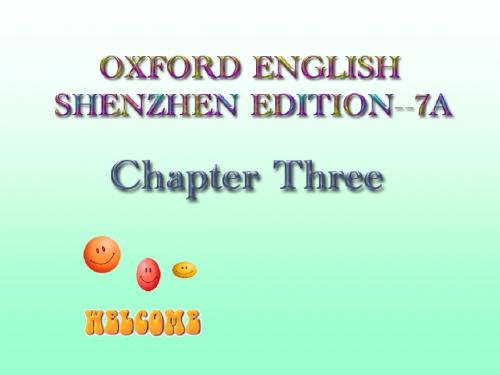
2.这些问题的简略答案 short answers to these questions
do/ deal with 3.对待;处理 4.Paul日记一则 a page from Paul’s diary
5.等待 wait for 6.伸出;取出 hold out stare at 7.盯着看;凝视 run away 8.逃跑 9.匆忙登上甲板 hurry aboard 10.跟着某人 go after somebody
The man held out a bag. = The man take out a bag. The woman holds out her purse.
=
The woman takes out her purse.
The man showed his bag to the women.
=
The little dog likes following the children.
see sb. doing sth.
见到某人正在做某事;强调“看见”和“做某 事”同时发生,表示动作正在发生,没有结 束。
I saw many people swimming in the sea.
我看见很多人在海里游泳。
10. aboard adv. 登船,登机
Are all the passengers aboard the ship?
所有的乘客都上船了吗?
hurry aboard 匆忙上(船、飞机等)
铃响了!我们赶紧登船吧。
The bell is ringing. Let’s hurry aboard.
The little dog likes going after the children.=
新编简明英语语言学Chapter7Languagechange语言变化分析解析

新编简明英语语⾔学Chapter7Languagechange语⾔变化分析解析Chapter 7 Language change语⾔变化知识点:1.*Definition: clipping; blend; acronym; back-formation2.Morphological and syntactic change3.*Vocabulary change4.Some recent trends in language change5.Causes of language change考核⽬标:识记:Definition: clipping; blend; acronym; back-formation领会:Morphological and syntactic change; Vocabulary change简单应⽤:Some recent trends in language change; Causes of language change⼀、定义1. Clipping略写词:A kind of abbreviation of otherwise longer words or phrases.指⽐较长的词或短语的缩写2. Blending 混合法:A process of forming a new word by combining parts oftwo other words.3. Acronym⾸字母缩略词:words derived from the initials of several words通过组合每个词的⾸位字母构成新词4. Back-formation 逆向构词法:new words are formed by taking away thesuffix of an existing word. 新词可以通过“去掉”现存的词的后缀⽽被创造出来⼆、知识点7.2 Phonological changes元⾳变化One of the most obvious change in English is the systematic and regular change in theAround the death of Chaucer in 1400,元⾳开始了进⼀步的转变。
chapter7单词
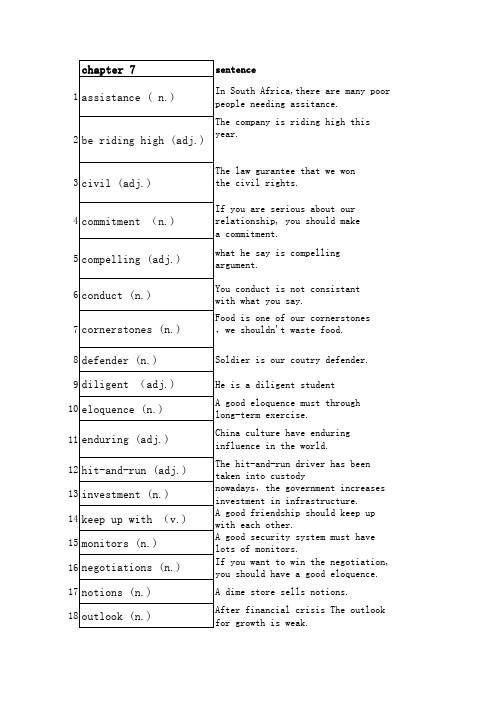
definitions collocationsChinese:帮助,援助English:aid, hand, help, boost technical assistance social assistanceChinese:得意洋洋的,成功的English:successful,high-blownChinese:公民的,民间的,有礼貌的。
English:folk, politecivil lawChinese:承诺,保证;委托;English:promise,ensuremake a commitmentChinese:引人注目的,激发兴趣的。
English:noticeable,compulsivecompelling forceChinese:行为, 举动, 品行English:behaviour,actionconduct researchChinese:基础。
English:basis,foundationChinese:防卫者,守卫者English:guarder,supporterChinese:勤勉的;用功的;English:hardworkingdiligent in Chinese:口才,雄辩English:elocutionChinese:持久的,能忍受的English:continued, lasting,sustainedChinese:打了就跑的;肇事逃逸English:Hit-and-run drivingChinese:投资;投入;封锁English:input, introjection investment in foreign investmentChinese:赶上,与…保持联系English:keep in touchChinese:监视器,监控器English:invigilatorvideo monitor Chinese:谈判,磋商English:consultationsChinese:观念,小商品English:perceptionsChinese:展望,观点,景色English:viewpointoutlook forChinese:压倒性的;势不可挡的English:inundatory,drowningoverwhelming superiority Chinese:充满,透过English:be full ofpermeate through Chinese:哲学的,冷静的English:cool, imperturbablephilosophical analysis Chinese: 威望,声望;声誉English:reputation, creditChinese:首先;主要地,根本上English:firstly, basically,mainlyChinese: 提升,促进English:advancementChinese:抑制, 压抑;镇压English:checking, controlChinese:顺从的;已辞职的English:obedient,tameresign fromChinese:牺牲,祭品English:offering, victimizationat the sacrifice of Chinese:逮住,捉住,查封的English:catchbe seized withChinese:奋斗,努力,抗战English:struggle,fight strive forstrive for freedomChinese:抑制;镇压;废止English:restrain,abolishsuppress inflation Chinese:无训练的;混乱无纪律的English:indisciplineChinese:违反;妨碍,侵害English:prevention,intervention,in violation of。
2015第1,2周英语语法 Grammatical Hierarchy

Inflectional Affix
1. -’s (genitive case) 2. -s/-es (plural nouns) 3. -s/-es (the third person singular verbs in simple present) 4. -ed (past tense verbs) 5. -ing, -ed (-ing participle, -ed participle form of verbs) 6. -er, -est (comparative, superlative degree of adjectives/ adverbs)
Sentence
Clause
Noun Phrase
Verb Phrase
Prepositional Phrase
Determiner Noun
Auxiliary Adverb Main Verb
Preposition Determiner
Noun
These undergraduates are rapidly improving in their writing.
Derivational Affix
• Prefix, Suffix (后缀),pre-suffix前后缀 • (Prefix) + Root 词根+ (suffix) • co-exist existence co-existence •
conclusion
Free M + Affix Free morpheme Free M + Free M
A New English Grammar Coursebook
Mrs. Huang
Traditional张道真
高考英语词汇3500【乱序版01】

1.package [ˈpækɪdʒ] n. (尤指包装好或密封的容器)一包,一袋,一盒①n. 一包例句:例句:He received a package from his friend in the mail.翻译:翻译:他收到朋友寄来的一包邮件。
单词注释: He(他,代词)received(收到,动词)a(一个,冠词)package(一包,名词)from(来自,介词)his(他的,代词)friend(朋友,名词)in(在,介词)the(这个,冠词)mail(邮件,名词)②n. 一袋例句:例句:She bought a package of flour at the store.翻译:翻译:她在商店里买了一袋面粉。
单词注释: She(她,代词)bought(买,动词)a(一个,冠词)package(一袋,名词)of(的,介词)flour(面粉,名词)at(在,介词)the(这个,冠词)store(商店,名词)③n. 一盒例句:例句:They gave me a package of chocolates for my birthday.翻译:翻译:他们送了我一盒巧克力作为生日礼物。
单词注释: They(他们,代词)gave(给,动词)me(我,代词)a(一个,冠词)package (一盒,名词)of(的,介词)chocolates(巧克力,名词)for(为了,介词)my(我的,代词)birthday(生日,名词)2. chapter [ˈtʃæptə(r)] n. 章① n. 章例句:例句:The first chapter of the book was very interesting.翻译:翻译:这本书的第一章非常有趣。
单词注释: The(这个,冠词)first(第一,数词)chapter(章,名词)of(的,介词)the(这个,冠词)book(书,名词)was(是,动词)very(非常,副词)interesting (有趣的,形容词)3. bathe [beɪð] vi. 洗澡;游泳① vi. 洗澡例句:例句:She likes to bathe in the evening.翻译:翻译:她喜欢在晚上洗澡。
七年级英语上册Unit7词汇与语法汇总(牛津版)

七年级英语上册Unit7词汇与语法汇总(牛津版)七年级英语上册Unit7词汇与语法汇总(牛津版)Unit 7 词语笔记attend【展示】1 h ill attend the eeting trr?哪些人将出席明天的会议?2 esterda I attended friend Lil’s edding昨天我参加了我朋友莉莉的婚礼。
3 sister Alie ften attends t her bab at he我姐姐爱丽丝经常在家照顾婴儿。
【总结】attend用作动词,意为“__________;参加”,如例1和例2;它常与介词t形成搭配,attend t意为“__________”,如例3。
es:出席;照顾根据汉语意思,完成句子。
1.我想邀请你出席下周的会议。
I ant t invite u the __________ __________ eeting next ee2.我不能和你出去,因为我要在家照顾妹妹。
I an’t g ut ith u, beause I need t __________ __________ sister at he surprised【展示】1 I as s surprised t see u at shl在学校看到妈妈,我感到很惊奇。
2 hen I tld her the str, she led s surprised当我告诉她那个故事,她看起很惊讶。
3 I gt a surprise hen I ne that he n the gae当我知道他赢了比赛时,我很惊讶。
4 The piee f nes surprised e a lt这则新闻让我很惊奇。
【总结】surprised用作形容词,意为“吃惊的;__________”,如例1和例2。
它的名词和动词形式都是__________,如例3和例4。
es:惊讶的;surprise【运用】根据汉语意思,完成句子。
英语二 unit 7 详细讲解
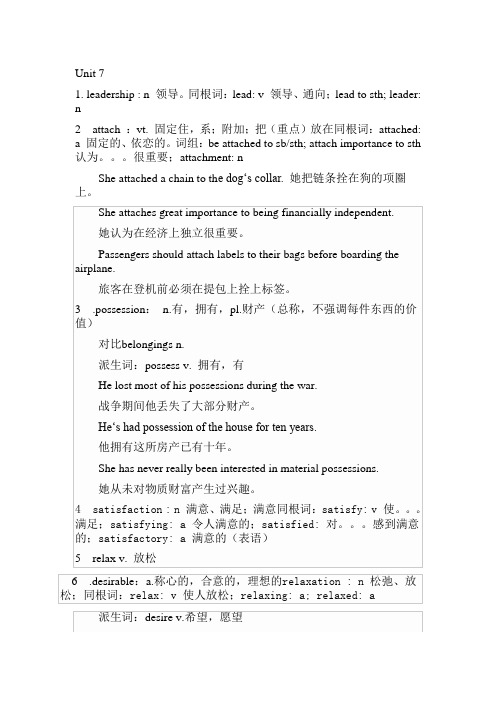
to come into contact with与……接触
Topics for conversation should be relevant to the experience and interests of the students.
谈话的题目应该与学生的经历与兴趣有关。
Any relevant information should be given to the police.任何有关信息都应交给警察。
反义词:passive a.消极的
He gave positive instructions.他给了明确的指示。
Can you be positive about what you saw?你能肯定你所见到的东西吗?
He always adopts a positive attitude when correcting student‘s mistakes.
He‘s had possession of the house for ten years.
他拥有这所房产已有十年。
She has never really been interested in material possessions.
她从未对物质财富产生过兴趣。
4satisfaction : n满意、满足;满意同根词:satisfy: v使。。。满足;satisfying: a令人满意的;satisfied:对。。。感到满意的;satisfactory: a满意的(表语)
participate v.参加
attain v.完成,达到
1.be concerned with:关于,关切,关注
Her job is something concerned with computers她的工作与电脑有关。
七年级英语上册Unit7Shopping重要知识点牛津版

Unit7 重要知识点1.down the street 沿着这条街down 沿着,向下Put down 放下let down 使……失望Write down 写下turn down 使……小声turn up 使……大声fall down 摔倒2.hate +n.hate doing sth. 讨厌做某事hate sb. to do sth. 讨厌某人做某事3.I don't have any money 我没有任何钱= I have no money.“not…any…”= noeg:He has no friends here.= He doesn’t have any friends here.4.Here’s my wallet. (倒装句)Here + be + n.Here +人称代词+be. Here you are.5.make moneyPocket money 零花钱Spend money like water 挥金如土6.carry 拿,提bring带来take 拿走get 取来7.Christmas is coming.圣诞即将到来8.be sure 确信 be not sure 不确信be sure to do sth. 一定要去做某事be sure of sth.肯定确信某事be sure + that从句9.maybe 用于句首may be +n./介词短语/adj.Maybe he is very tired.= He may be very tired.10.be interested in sth.对某事感兴趣be interested in doing sth. 对做某事感兴趣11.collect sth.收集某物Collect sth. for sb.为某人收集某物12.You are welcome. =That’s all right. =Not at all. 不客气13.---Can / Could / May I help you? = What can I do for you? = Is there anythingI can do for you?肯: ----I want …………/ I’d like to buy……/-----Do you have……? / I’m looking for……否: -----No,thanks./I’m just looking.14.just a minute./wait a minute.稍等片刻15.take/have a look 看一下take/have a look at=look at16.物+cost(s)+金钱某物值多少钱物+cost(s)+sb.+金钱某物花费某人多少钱It takes sb.+金钱/时间+to do sth人+spend(s)+金钱/时间+doing sth.人+pay(s)+金钱+for sth. 某人为某物支付了多少钱17.How much do/does +主语+cost?=How much are/is+主语=What ’s the price of+主语18.match 与……相配 = go well withmatch A with B 把A 与B配起来19.pretty 小孩偏亮可爱的年轻女性温柔纤巧事物精致美观beautiful 女性产生美感事物美丽的20.enough adj. enough + n. 足够的……adv. 形容词+enough + to do sth. 足够……去做某事Eg:My sister is old enough to go to school.21.be different from……与……不同 = not the same as……22.Pocket money 零花钱23. Poor adj.贫穷的反义词:rich in poor areas在贫穷地区劣质的,差的 My Engish is poor.24.the old 穷人 the rich 富人 the young 年轻人25.most of + n.(复数)……的大多数the most+形容词最……的(最高级)26.area 地区,地域/ 面积the area of……is…………的面积是……27.thank you for your help 感谢你的帮助thank you for doing sth.28.a pair of shoes/socks/trousers/glasses/boots29.---Waht’s your size?---Size……→How big: 通常询问面积,体积What size:“什么尺寸”,用于询问某人的衣服或者鞋等尺寸30.try on 试穿 try It on31.fit very well 非常合身fit sb.适合某人32.expensive →cheap an expensive……33.the other 两者中的另一个another (3者以上)另一个,又一个34.the price for……提供给……的价格the price of…………的价格rge 面积大(一般不形容人)big 体积大(既可形容人,也可形容物)36.make/take notes 记笔记take note of 注意,留意37.at the top of……在……的顶部the top of one’s head 某人的头顶on top of ……在……的上面38.top floor 顶楼39.foods from different areas 来自不同地区的事物40.food here这儿的食物the people here 这儿的人the life there 那儿的生活41.The mall is a good place (to meet friends and have fun).购物中心是朋友聚会和娱乐的好地方Some & any词汇修饰词汇常用句型例句Some 可数/不可数名词肯定句I have somefriends.any 可数/不可数名词一般疑问句Are there any birdsi the tree?否定句The child doesn’thave any money.1.some 还用于表示建议或委婉请求的问句中,这种情况一般希望得到对方的肯定回答Eg:Can I have some bread?2.any 在肯定句中用于单数可数名词前,意为“任何的”Eg:Any boy can work out the maths problem.任何男孩都能做出这道数学题there be句型:表达某地有某人或某物句型结构例句肯定句There be+名词(+地点状语)There is some rice in the bowl.否定句There be+not +名词(+地点状语)There aren’t any apples on thetree.一般疑问句Be there+名词(+地点状语)?肯定回答:Yes,there be.--Is there a big tree near thehouse.后置定语否定回答:No,there be not. --Yes, there is.No, there isn’t.特殊疑问句特殊疑问词+名词+be there (+地点状语) How many boxes are there in the room?There is 可数名词单数 / 不可数名词There are 可数名词复数就近原则There be 后面接多个名词时,be动词的形式取决于最靠近be动词的名词数There be & have There be 表示“某人或某物存在于某地”Have 表示“某人或某物拥有某东西”,强调所属关系对there be句型的主语(名词)提问,要用‘what is+地点状语’,无论原句主语时单数还是复数,提问时be动词只能用is,回答时要根据具体情况而定。
Chapter 7 A trip to the theatre答案(1)1
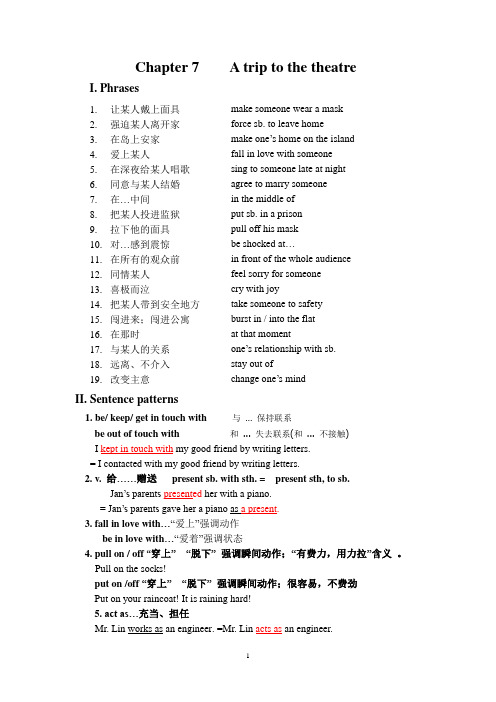
Chapter 7 A trip to the theatreI. Phrases 1. 让某人戴上面具 2. 强迫某人离开家 3. 在岛上安家 4. 爱上某人 5. 在深夜给某人唱歌 6. 同意与某人结婚 7. 在…中间 8. 把某人投进监狱 9. 拉下他的面具 10. 对…感到震惊 11. 在所有的观众前 12. 同情某人 13. 喜极而泣 14. 把某人带到安全地方 15. 闯进来;闯进公寓 16. 在那时 17. 与某人的关系 18. 远离、不介入 19. 改变主意 II. Sentence patterns1. be/ keep/ get in touch with 与 … 保持联系be out of touch with 和 ... 失去联系(和 ... 不接触)I kept in touch with my good friend by writing letters.= I contacted with my good friend by writing letters.2. v. 给……赠送 present sb. with sth. = present sth, to sb.Jan’s parents presented her with a piano.= Jan’s parents gave her a piano as a present.3. fall in love with …“爱上”强调动作be in love with …“爱着”强调状态4. pull on / off “穿上” “脱下” 强调瞬间动作;“有费力,用力拉”含义 。
Pull on the socks!put on /off “穿上” “脱下” 强调瞬间动作;很容易,不费劲Put on your raincoat! It is raining hard!5. act as…充当、担任 Mr. Lin works as an engineer. =Mr. Lin acts as an engineer.make someone wear a maskforce sb. to leave homemake one ’s home on the islandfall in love with someonesing to someone late at nightagree to marry someonein the middle ofput sb. in a prisonpull off his maskbe shocked at …in front of the whole audiencefeel sorry for someonecry with joytake someone to safetyburst in / into the flatat that momentone ’s relationship with sb.stay out ofchange one ’s mind6. so… that …. “如此…以致…”也可以跟“too…to…”转换。
英语语法动词的语态及非谓语动词
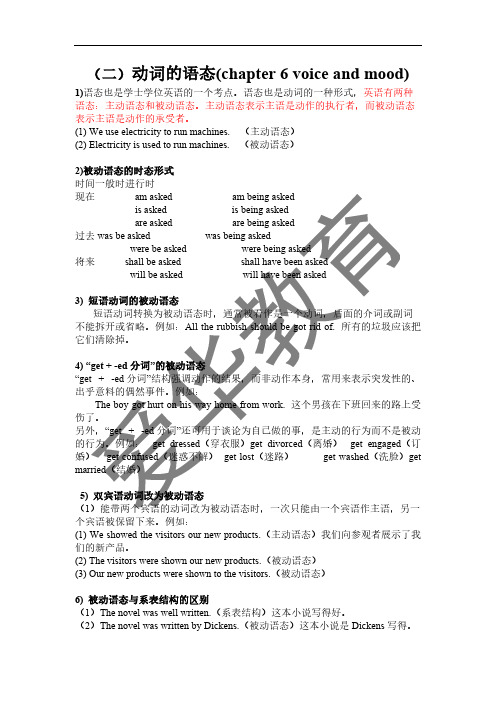
(二)动词的语态(chapter 6 voice and mood) 1)语态也是学士学位英语的一个考点。
语态也是动词的一种形式,英语有两种语态:主动语态和被动语态。
主动语态表示主语是动作的执行者,而被动语态表示主语是动作的承受者。
(1) We use electricity to run machines. (主动语态)(2) Electricity is used to run machines. (被动语态)2)被动语态的时态形式时间一般时进行时现在am asked am being askedis asked is being askedare asked are being asked过去was be asked was being askedwere be asked were being asked将来shall be asked shall have been askedwill be asked will have been asked3) 短语动词的被动语态短语动词转换为被动语态时,通常被看作是一个动词,后面的介词或副词不能拆开或省略。
例如:All the rubbish should be got rid of. 所有的垃圾应该把它们清除掉。
4) “get + -ed分词”的被动语态“get + -ed分词”结构强调动作的结果,而非动作本身,常用来表示突发性的、出乎意料的偶然事件。
例如:The boy got hurt on his way home from work. 这个男孩在下班回来的路上受伤了。
另外,“get + -ed分词”还可用于谈论为自己做的事,是主动的行为而不是被动的行为。
例如:get dressed(穿衣服)get divorced(离婚)get engaged(订婚)get confused(迷惑不解)get lost(迷路)get washed(洗脸)get married(结婚)5) 双宾语动词改为被动语态(1)能带两个宾语的动词改为被动语态时,一次只能由一个宾语作主语,另一个宾语被保留下来。
英语语言学概论第七章笔记.
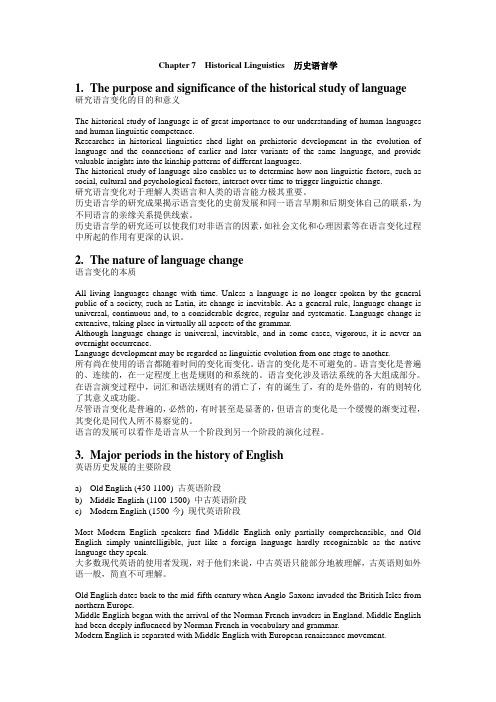
Chapter 7 Historical Linguistics 历史语言学1.The purpose and significance of the historical study of language研究语言变化的目的和意义The historical study of language is of great importance to our understanding of human languages and human linguistic competence.Researches in historical linguistics shed light on prehistoric development in the evolution of language and the connections of earlier and later variants of the same language, and provide valuable insights into the kinship patterns of different languages.The historical study of language also enables us to determine how non-linguistic factors, such as social, cultural and psychological factors, interact over time to trigger linguistic change.研究语言变化对于理解人类语言和人类的语言能力极其重要。
历史语言学的研究成果揭示语言变化的史前发展和同一语言早期和后期变体自己的联系,为不同语言的亲缘关系提供线索。
历史语言学的研究还可以使我们对非语言的因素,如社会文化和心理因素等在语言变化过程中所起的作用有更深的认识。
Side by side chapter 7

there be 的疑问式: 1. There is a book in the bag. Is there a book in the bag? Yes,there is . No.there isn’t.
there be 的疑问式: 2. There are many books in the bag. Are there many books in the bag? Yes,there are. No.there aren’t.
balcony
kitchen dining room
bathroom study
living room
bedroom
be 结构 Grammar There be 含一般谓语动词 (表 “存在”)
There
主语在be动词后,be 动词的数 必须与后面的主语一致。
如:There
is a teacher. There are four teachers.
Housing &Furniture
Question Time
1.Do you have a house (房子)? 2.Do you like your house? Why?
3.Tell me about your house?
Tell Me About the Apartment
apartment
shower
closet
stove
window
washing machine
table
refrigerator, fireplace, washing
machine closet, stove, window,
There
is a fireplace in the living room.
chapter的相关用法
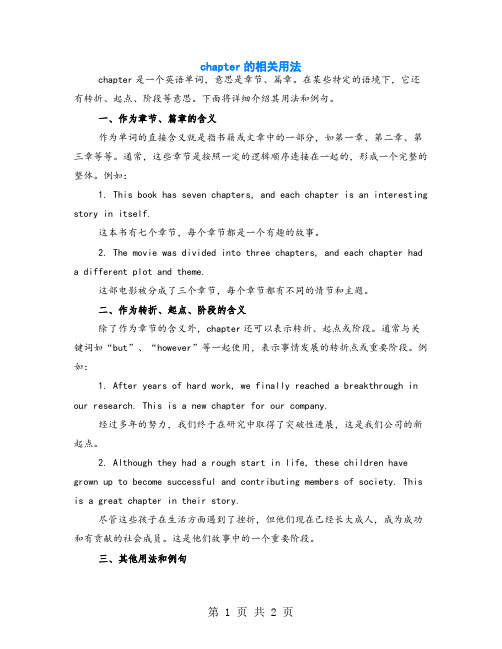
chapter的相关用法chapter是一个英语单词,意思是章节、篇章。
在某些特定的语境下,它还有转折、起点、阶段等意思。
下面将详细介绍其用法和例句。
一、作为章节、篇章的含义作为单词的直接含义就是指书籍或文章中的一部分,如第一章、第二章、第三章等等。
通常,这些章节是按照一定的逻辑顺序连接在一起的,形成一个完整的整体。
例如:1. This book has seven chapters, and each chapter is an interesting story in itself.这本书有七个章节,每个章节都是一个有趣的故事。
2. The movie was divided into three chapters, and each chapter hada different plot and theme.这部电影被分成了三个章节,每个章节都有不同的情节和主题。
二、作为转折、起点、阶段的含义除了作为章节的含义外,chapter还可以表示转折、起点或阶段。
通常与关键词如“but”、“however”等一起使用,表示事情发展的转折点或重要阶段。
例如:1. After years of hard work, we finally reached a breakthrough in our research. This is a new chapter for our company.经过多年的努力,我们终于在研究中取得了突破性进展,这是我们公司的新起点。
2. Although they had a rough start in life, these children have grown up to become successful and contributing members of society. This is a great chapter in their story.尽管这些孩子在生活方面遇到了挫折,但他们现在已经长大成人,成为成功和有贡献的社会成员。
上海市初中英语语法汇总

Chapter1词类和词类转换n. pron. adj. num. v. adv. art. prep. conj. interj.1.派生词(词根+词缀)2.兼类词(词形不变,多个词性)3.合成词(一般由两个或两个以上的词合成)Chapter2名词1.名词复数的构成(规则变化、不规则变化)如sports meet,take notes等基数词+可数名词,如twenty cups;可数名词可与(a)few,many,a large/small number of,some等连用表示不定数量。
如a pair of shoes.如a piece of news.如sheep,ice cream等.如change(零钱、变化).’s所有格的主要用法Of+名词,如the end of the term.O’s =one of Mr. White’s friends.Chapter3代词(1)it作代词代替上文中提到的无生命的事物或幼儿、动物。
(2)作“这、那”解,指心目中的人。
(3)作无人称动词的主语,表示时间、天气和距离。
(4)作先行词,引导非谓语动词如动词不定式。
物主代词分为形容词性和名词性。
each other, one another1.who,what2.who,which3.what,which1.one(s)2.some,any3.something,anything,nothing,everything4.someone/-body;anyone/-body;no one/-body;everyone/-body5.anyone/anybody,any(one)of6.on one/nobody,none,nothing7.everyone/everybody,every (one) of,each(one)of8.one,everyone9.both,all10.either,any11.neither,none12.another,other(s)13.(a)few,(a)little14.many,much(1)all/both+the或物主代词。
新英汉翻译课件教程 Chapter 词义的处理
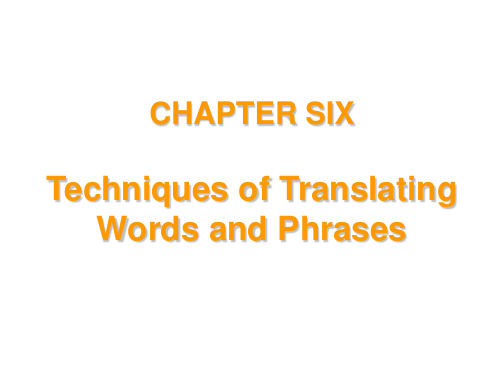
• 例1:The capacity to use a raw material depends on various factors, such as means of access, methods of extraction, and techniques of processing.
• 【译文】使用原料的规模大小取决于各种因素,比如获取 原料的手段、开采方法和加工技术。
b) 给表示现象、动作、状态、方法或过程的名词添加范畴。 • 例1:He was described as impressed by Teng’s
flexibility
• 【译文】据说他为邓灵活的态度所感动。 • 例2:At the same time, inequality has become worse,
poverty has increased absolutely.
• 【译文】同时贫富不均的现象变得更加严重,贫穷者的绝 对数增加了。
• 例3:The Chinese delegation will never accept such dictation.
• 【译文】中国代表团决不同意这种独断专行的做法。 • 例4:The gathering gloom of a November evening
• A.我们不能为了国家的安全而花太大的代价。 • B.为了国家的安全花再大的代价也值得。
商务英语笔译 chapter 7
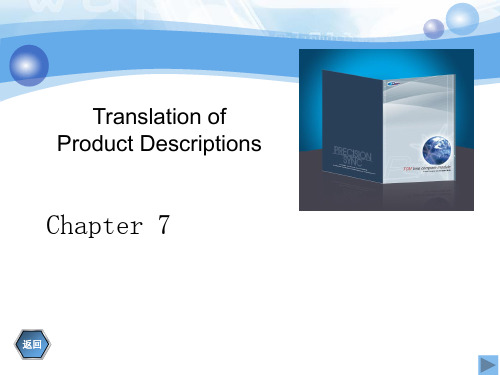
例如: ①The type CYJ15-18-18 oil pumping machine is of simple and compact construction. 译文:CYJ15-18-18型抽油机的结构紧凑。 ②The wiring should be in good condition and core flex should not be exposed. 译文:这些配线必须完好无算,中心导体不得裸露。
SECTION 3
Sec 1
II. 产品说明书的翻译技巧(6)
Sec 2
Sec 4
Sec 6
Sec 7
(4)现在分词 + 名词 这种句型用于说明维修或操作程序及说明有 关技术要求。例如: Simultaneously cutting two pieces of sheet is strictly forbidden. 译文:绝对禁止同时冲剪两块板材。
Translation of Product Descriptions
Chapter 7
返回
SECTION 1
Sec 2
产品说明书在英语中通常有不同的说法,即 Instruction Direction Description
Sec 3
Sec 4
Sec 6
Manual
Specification
Sec 7
Sec 6
Sec 7
Sec 8
返回
SECTION 3
Sec 1
II. 产品说明书的翻译技巧(2) (2)注意语言的可读性和感染力。
Sec 2
由于说明书对广告具有辅助作用,其语言要做到通俗易懂,适当时候可以运 用一些文学语言,以完成其广告效应。例如: ① Add sugar and milk to taste. 译文:加入适量的牛奶和糖,味道更佳。 ② A nourishing beverage for all ages. An excellent gift in all seasons.
- 1、下载文档前请自行甄别文档内容的完整性,平台不提供额外的编辑、内容补充、找答案等附加服务。
- 2、"仅部分预览"的文档,不可在线预览部分如存在完整性等问题,可反馈申请退款(可完整预览的文档不适用该条件!)。
- 3、如文档侵犯您的权益,请联系客服反馈,我们会尽快为您处理(人工客服工作时间:9:00-18:30)。
Helping Verbs (P160-163)
1. be, have, do (tense, voice, question) 2. shall, will, should, would 3 can, could, may, might, must 4 need, dare, ought to, have to,
c) transitive & intransitive verbs
• Some verbs can be both transitive and intransitive.
e.g.
• Michael Jackson sings. (vi.) • Michael Jackson sings a song. (vt.) • (More examples on page143) • 有些动词形式相近,但分属及物动词和不及物 动词,要特别注意他们之间的区别,例如:
set phrases
Four main types of set phrases: vt.+ adv.
• They are going to knock down those houses. • He is trying to bring about an agreement.
vt./vi.+ adv.+ prep. • I’m looking forward to the English Festival. • Very few experts come up with completely new ideas
examples
linking verbs
• It is cold. • The book is on chemistry. • As he waited, he became ( grew) impatient. • The soup smells sweet. • The music sounds beautiful.
a) transitive verbs (及物动词)
• A transitive verb must be followed by an object (object---n. gerund) . e.g. • Tom catches Jerry. • Tom gave Mary a book. • Did you read that novel? • Mr. Wu teaches us English grammar.
linking verbs 1. be + n./adj./prep. /pron./ participle (-ed, -ing)/clause /phrase 2. others + n. /adj. e.g.: He has turned traitor. • (Page 152-160)
linking verbs
irregular verbs
• • • • • • • 4. 三种形式都不相同 break—broke—broken eat—ate—eaten choose—chose—chosen grow— grew — grown ring— rang — rung wake— woke — woken
Put the following into passive voice.
• • • • • • • • 1.They are building a bridge over the river. A bridge is being built over the river. 2.They have broken into his house. His house has been broken into. 3.They made him work 12 hours a day. He was made to work 12 hours a day. 4. She didn’t like them to treat her as a child. She didn’t like to be treated as a child.
b) intransitive verbs (不及物动词)
• An intransitive verb cannot be followed by any object.
e.g.
• Tom smiles. • He runs very fast. • What happened? The baby screamed at me. • Don’t hesitate to come and visit me.
非谓语动词Non-finite Verbs
• • • • • • • • • 1. the infinitive 不定式 To see is to believe. I hope to see you soon. (宾语) Let me help you. (归纳不带to的动词) (let, make, see, hear, watch, notice, feel, listen to, look at, have等) 比较下面形式: You are free to go now. I am sorry to have given you so much trouble. She happened to be travelling in that area.
Helping verbs The child didn’t break the glass. They can offer me a good job. Notional verbs 实义动词 The child broke the glass. They offer me a good job.
modal verbs(情态动词)
• 有一定的意义,但意义不完整,不 能独立用作谓语 • shall, should, will, would, can, could, may, might, must, dare, need, ought to
EXAMPLES
model verbs
• 1. If you want to visit somebody, you should call him first. • 2. He can speak three languages. • 3. The child dare not go out at night. • Cf. The child doesn’t dare to go… • 4. We need remind them of the deadline of their papers.
动词的各种形式(P163)
• • • • 动词的四种主要形式? 现在式/过去式/过去分词/现在分词 过去式和过去分词的构成 (规则动词)P164
g) irregular verbs (不规则动词)
• • • • • 1. 三种形式同形 cost--cost--cost hurt--hurt--hurt spread--spread--spread 其中,少数几个动词的过去式与过 去分词兼有两种形式 • knit--knit/knitted--knit/knitted • bet--bet/betted--bet/betted • 但:lie, hang等
e) linking verbs 系动词
• A linking verb must be followed by a predicative.
Frequently seen linking verbs: P152 (20个) 1. be 2. appear, become, get, sound, seem, remain 3. feel, taste, smell, look
• 有些与形容词连用的动词也起联 系动词的作用,如: • • • • blow open break loose prove correct stand quiet blush red grow red fall ill turn yellow
f) helping verbs— modal verbs, auxiliary verbs
Exercises
• 1. Dare you go to the Yinhe Tombs alone at B night? • A. Yes, I do. B. No, I dare not. • C. No, I don’t. D. Yes, I dare to • 2. Need we come tomorrow? B • A. No, you don’t need to B. Yes, you must C. Yes, you need D. No, you mustn’t
vi.+ adv.
• The war broke out in 1939. • At last the wild wind calmed down.
vi.+ prep.
• I ran across her in the library yesterday. • He tried on several jackets and finally picked out a blue one.
• lay(放) • raise(举,喂养)• set(放) • lie(躺) • rise(升) • sit(坐)
d) set phrases/phrasal verbs
Look. Look at me. Look after me.
set phrases
Four main types of set phrases:
• 1. They are cleaning the meeting room. • 2. The paper has been revised. • 3. She didn’t know the way to the railway station. • 4. What do you think of their suggestion? • 6. We’ll discuss this again sometime next week.
